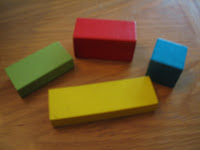Idea 1:
Raid your children's block shelf. All different shapes of solids with a length, width, and height that can be measured. If you don't have children with blocks, see if you can borrow some or check yard sales or thrift stores. Your blocks don't have to come from one set - variety is good!
Label each block with a letter (use masking tape if you don't want to mark on the block itself). Calculate the volume of each and create a key.
Idea 2:
Idea 3:
Raid your recycling and gather a variety of bottles and jars. Have your students find the volume of water each jar holds. (Remove the labels for the jars and bottles, or at least remove the portion that states the volume, if applicable. Don't worry, stubborn labels will come off with enough student use).
Again, label each jar with a letter. Determine the volume of each and create a key.
Save your blocks, boxes and jars and next year you'll be ready to go, with the key and everything. Just pull it out and have your students get to work!


